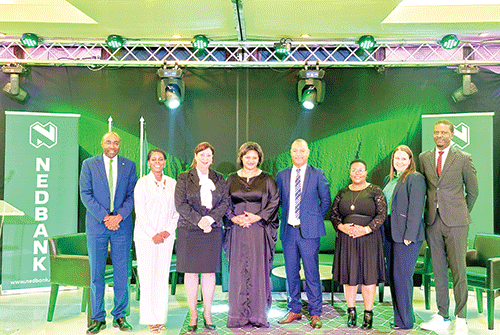Nedbank Namibia managing director Martha Murorua has reinforced the bank’s role in aligning with the socio-economic goals of the national budget.
“We recognise that every dollar that we lend to our clients has the potential to deliver value beyond their immediate financial requirements. We, therefore, work with our clients to use our combined resources and knowledge to identify commercial opportunities that can help to resolve the various socio-economic issues facing our Land of the Brave,” she said last Friday.
Murorua was speaking during an event where Nedbank hosted members of the Swakopmund and Walvis Bay business communities on Friday, 15 March to discuss the 2024/2025 national budget tabled in February by finance and public enterprises minister Ipumbu Shiimi.
Speaking at the same event, deputy executive director in the finance and public enterprises ministry, Oscar Capelao, delved into the national budget’s tax proposals.
“We maintained a policy stance to not consider new tax policy proposals, specifically those with the potential to stifle economic recovery and compromise the emerging growth prospects. Broadly, we still maintain the same view, and as such, this budget continues specific tax policy proposals aimed at providing some relief to taxpayers with the aim to boost domestic demand, broadening the tax base to improve revenue mobilisation, and enhancing the competitiveness of the tax system to attract investments and foster private sector development,” he said.
Salomo Hei from High Economic Intelligence Namibia, conducted a short presentation on Namibia’s economic landscape, where he provided budget statement recommendations.
“We should prioritise areas which include digitalisation to boost productivity growth and green investment to enhance resilience on renewables, and increase energy conversion on the back of enabling legislation”, said Hei.
The event also featured a panel discussion, which tackled the impact of the budget allocation. Moderated by the managing partner of Sequoia Tax and Legal Advisory Elizabeth Manasse, the panel included Capelao; PwC Namibia country senior partner Chantell Husselmann; Hei; Bank of Namibia technical expert Bernie Zaaruka; and executive director in the education, arts and culture ministry, Sanet Steenkamp.
The discussion covered a range of topics, and panellists engaged in lively and informative discussion, sharing their individual perspectives and insights on the critical issues raised amongst themselves and from the guests in attendance.
One such notable takeaway from Steenkamp was: “We need to invest at the foundational level of education, and come up with targeted intervention
strategies”.



